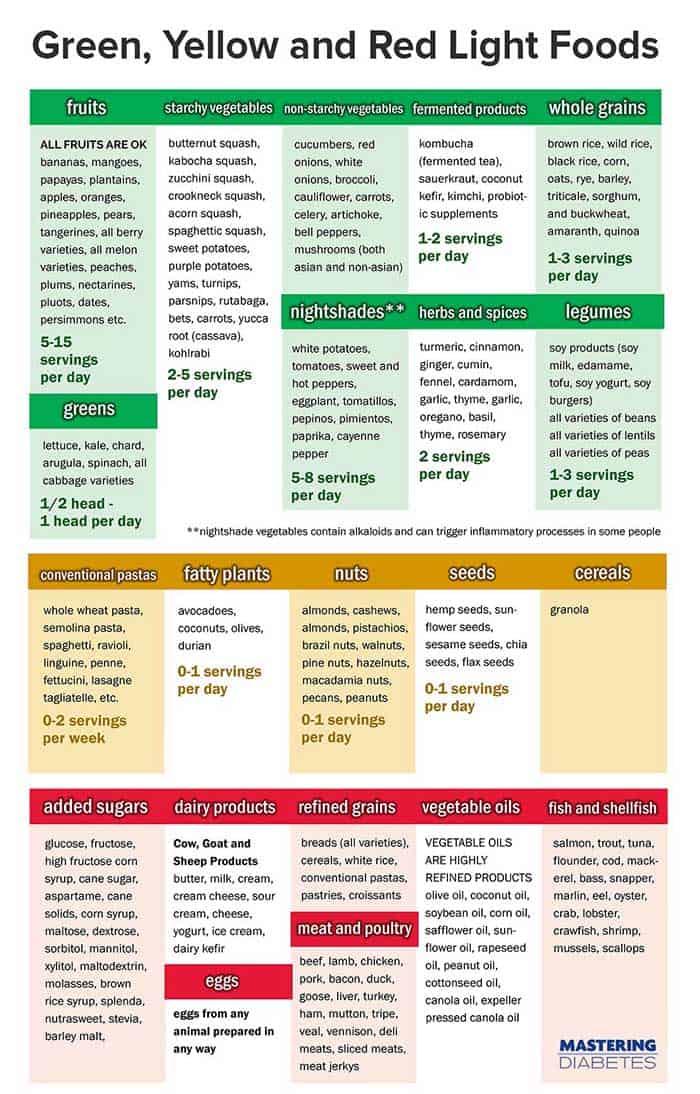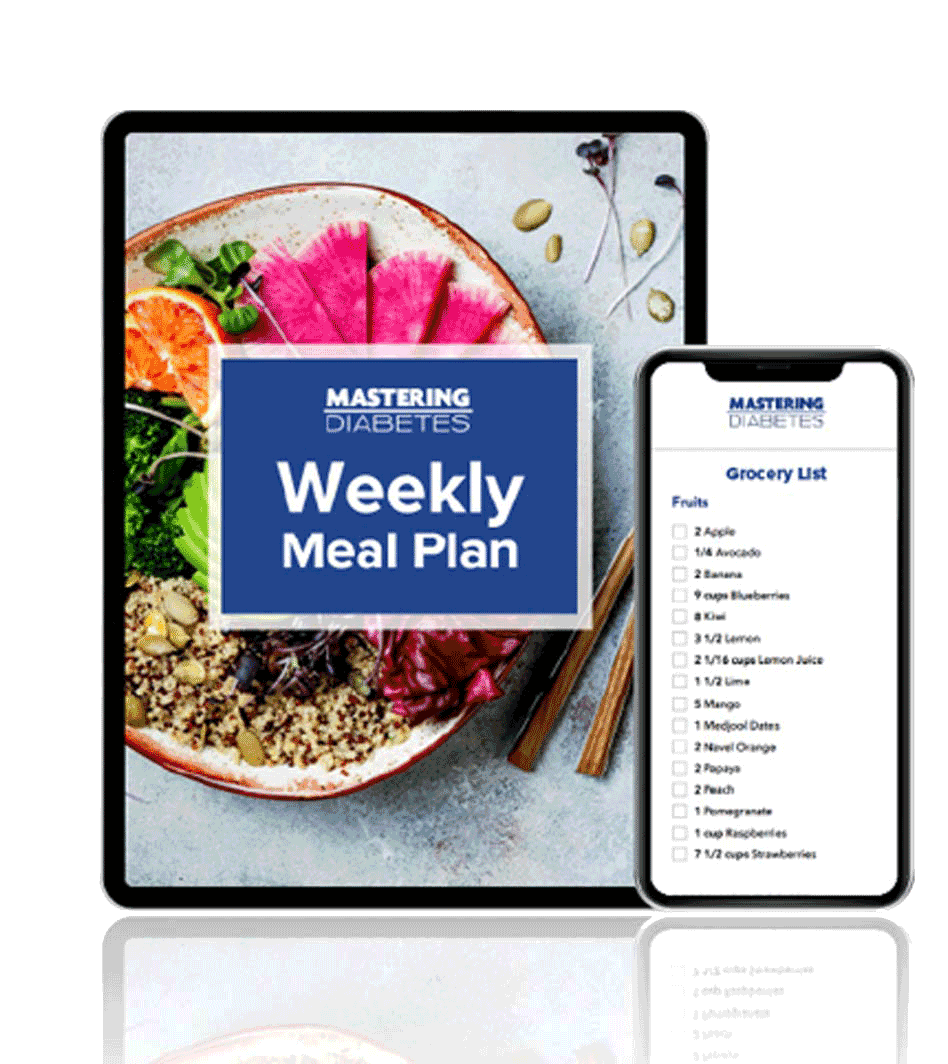
The Diabetes - Diet Connection
Both Robby and I were diagnosed with type 1 diabetes when we were young (he at age 12, myself at age 22), and together we’ve been living with diabetes for over 35 years.
In that time, we’ve experienced the struggle many others like us have faced, the struggle of desperately trying to manage our condition and live happy, fulfilling lives while surrounded by incomplete, confusing, and often contradicting information.
We’ve suffered through long years of fear, vulnerability, and hopelessness, where we felt crippled, where we thought it would never be possible to be active, energized, and normal again.
But we’ve also experienced the power that changing our diets has given us, the control it’s returned to our lives. As Robby and I began to discover a diet that worked for us, our lives were transformed.
I was able to be active again, to play soccer and ride my bike and work out, things I hold dear to my heart. Robby rediscovered his natural energy and vigor for life, and saw chronic conditions he’d been battling for decades completely disappear.
To learn more about our personal stories, listen to this fantastic episode of the Rich Roll Podcast.
Mastering Diabetes Through Diet
Your diet can absolutely transform your life when you are living with diabetes. And once Robby and I discovered that fact, we founded Mastering Diabetes to share our knowledge with others.
We don’t say this lightly, and we don’t take our recommendations to others lightly. Yes, Robby and I found a method that worked for us, but we didn’t stop there.
The Mastering Diabetes Method is a result of dozens of years of research, supported by thousands of evidence-based, peer-reviewed sources. We are STICKLERS for the science, and make sure that everything we share, every piece of advice, is true and supported by multiple sources.
In a world of confusing, often contradicting information surrounding diabetes health, that is our promise to you.
The Real Results
In this article, we’ll take a look at the health benefits of a low-fat, plant-based, whole-food diet, especially for those living with insulin resistance, prediabetes, type 1 diabetes, and type 2 diabetes.
We’ll also look at some other commonly recommended diets for people with diabetes, and discuss their comparative effects on your:
Exactly What Is A “Diabetes Diet,” Anyway?
Recently, many doctors have begun to follow a treatment methodology utilizing strategic diet changes to improve blood glucose control.
Some of these recommendations, like eliminating refined sugars and other refined ingredients, can dramatically improve your blood glucose control and reduce your risk for long-term complications.
However, there are also some major problems with this common model, which often focuses on high-fat, low carbohydrate diets.
The Three Sources of Energy
In a broad sense, your body derives energy from three sources: carbohydrate, fat, and protein.
From this perspective, most diets are easy to understand, especially when it comes to diabetes and insulin resistance.
In this article, we’ll touch on the most common recommendation — high-fat, low-carbohydrate diets — and explain why the research actually shows that for people with diabetes, the best option is actually almost the opposite.
The Problem with High-Fat, Low-Carbohydrate Diets
These diets, which include ‘Keto’, ‘Paleo’, and the Atkins diet, are some of the most popular diets on the planet, and they are often highly recommended for those with diabetes.
However, despite the fact that these diets can provide short-term results, over time they can actually result in increased insulin use, oral medication use, and A1c over time.
The main issue with these low-carbohydrate diets is that they ignore the underlying causes of high blood glucose levels (insulin resistance), and instead prescribe a ‘quick fix’.
In many cases, a high-fat, low-carbohydrate diet results in reduced insulin needs, lower A1c values, reduced fasting insulin and glucose, reduced triglycerides, weight loss, and increased HDL cholesterol in the short-term.
However, a high-fat, low carbohydrate diet actually increases insulin resistance over time, and can cause long-term negative effects including:
The Low-Fat, Plant-Based, Whole-Food Nutrition to Maximize Insulin Sensitivity
To find a long-term solution, the research instead points to a low-fat, plant-based, whole-food diet, one that is high in whole carbohydrates.
This diet matches the immediate results of increased insulin sensitivity from ketogenic diets, and results in:
The crucial difference with the low-fat, plant-based, whole-food diet is that these benefits are sustainable in the long-term.
Why Haven’t I Heard of This Before?
One possibility that the low-fat, high-carbohydrate diet hasn’t become as popular is due to the confusion between plant-based, whole carbohydrates, and artificial or refined carbohydrates.
A diet that is high in artificial sweeteners, refined foods, and simple carbohydrates like added sugars will spike your glucose and negatively affect your diabetes health, and we recommend removing them from your plate and your pantry entirely.
Making this distinction can be daunting, which is why we have a very simple, easy-to-follow set of reference guidelines.
Diabetes Management Through Diet: Guidelines
Red Light, Green Light, Yellow Light Foods
Following this diet is actually very simple, following a clear “green light, yellow light, red light,” categorization for foods.
“Green light” foods include:
In this diet, you can eat green light foods ad libitum, which means as much as you want! No portion control needed.
These are unrefined whole foods with a high nutrient density that have been consistently proven to reverse insulin resistance.
“Yellow light” foods include:
These yellow light foods are okay to include in small quantities, because they are slightly processed or have higher fat content. If you’re living with diabetes or insulin resistance, they shouldn’t be daily staples, but are still a “healthy” choice.
“Red light” foods include:
We recommend removing red light foods from your cabinet, your fridge, and your plate.
These foods are documented by evidence-based research to cause insulin resistance, and increase your blood glucose (fasting and post-meal).
They also promote chronic diseases not only for those with diabetes, but for anyone.
The Results of the Lifestyle
You can find a thriving community involved in the low-fat, plant-based, whole-food diet right here at Mastering Diabetes.
Thousands of people have already regained control of their blood glucose, reduced or reversed insulin resistance, lost weight, and improved their energy and overall health just by changing their diet.
For example, Affaf was able to regain control of her life after years on the “blood glucose rollercoaster,” in what she calls a total type 1 diabetes makeover.
After following the low-carbohydrate diet to the T and exercising frequently, Regina was still gaining weight and had an A1c over 12.0%. After switching to a low-fat, plant-based, whole-food diet, Regina cut her A1c by more than a half by her next doctor’s visit.
We’ve spent years researching and refining these guidelines, and we’re constantly updating them to stay in line with our lived experience, that of our community, and the most up-to-date research available.
Diabetes Diet Food List: What To Eat And What To Avoid

The benefits of the green-yellow-red light system are that you have a quick reference for healthy foods that make your food choices simple.
If they’re green, you can eat as much as you want. If yellow, they’re probably best in moderation. And reds we recommend removing from your plate and your pantry.
One of the best parts of following this system is that you naturally integrate foods that provide a wide variety of health benefits, like high fibers, nutrients, minerals, and a wide variety of protective effects that help your entire body.
Making it Happen
Looking to make this a reality, to feel better, have more energy, and get your health under control, but a bit daunted by the shift? We get it. For most of us, this can be a big transition, especially if you’ve grown up on a standard American diet.
That’s why our coaches are here to help. Here at Mastering Diabetes, we have a team of expert coaches that can help you every step along the way, from understanding how to pick foods and ingredients based on this system, to meal planning and more.
What About Alternatives? | Diabetes Diet FAQs
There’s a lot of information out there about a lot of different diets for healthy eating, all designed to help maintain healthy blood pressure, blood glucose, weight, and other biomarkers.
In this section, we’re taking a moment to focus on some other diets you may encounter, as well as some commonly asked questions about keeping a balanced diet for diabetes.
Keto (And Similar) Diet For People with Diabetes
The ketogenic diet, more commonly known as ‘Keto’, is a low-carbohydrate, high-fat diet that emphasizes unrefined products. Similar diets include the Atkins diet.
While placing the focus on natural sources of nutrition is always good, and the ketogenic diet can have excellent short term benefits, in the long term this diet can be disastrous for insulin resistance and your diabetes health.
The Final Word: If you’d like to read more about exactly why this emphasis on minimizing carbs is bad in the long run, you can dive deeper into the science in this article debunking 7 misleading statements about ketosis and ketogenic diets.
Paleo Diet For People with Diabetes
The ‘paleo’ diet is an umbrella term for diets emphasizing raw, organic, and natural products that would have been available during the paleolithic era.
Often referred to as the ‘caveman’ diet, paleo is another diet that has very positive effects. By focusing on eliminating refined products, and more carefully aligning your diet with what humans have evolved to eat are both beneficial.
However, even within these ‘paleo’ guidelines, there is often a high proportion of meats and fats, which can drastically increase your insulin resistance in the long-term.
There are a wide variety of dietary balances that can classify as ‘paleo’, and while some can be very advantageous for your diabetes health, others can be disastrous.
The Final Word: The focus on natural products is good, but strictly focusing on ‘paleo’ guidelines is not ideal for diabetes health.
Mediterranean Diet For People with Diabetes
The Mediterranean diet is modeled after the diet followed in the eponymous region, which is often associated with longevity. This diet emphasizes minimal consumption of meats, with an emphasis on fruits, vegetables, berries, and intact whole foods.
Research has shown that the Mediterranean diet has been proven to reduce chronic disease, and is vastly better for diabetes health when compared to the standard American diet.
The Mediterranean diet is essentially a milder form of the LFPBWF diet, which emphasizes the same plant-based, low-fat diet, but also includes some red light foods in moderation.
The Final Word: The Mediterranean diet is certainly better for diabetes health than the standard American diet or ketogenic diets, and may be an option if you’re looking to prevent diabetes, or gradually improve your diabetes health.
However, if you’re looking to most effectively reverse insulin resistance, the presence of red light foods like meats and seafood may be counterproductive.
A Vegan Diet For People with Diabetes
The vegan diet has a significant overlap with the low-fat, plant-based, whole-food diet in that it eliminates two major areas of the red light foods: meat and dairy products.
In addition, if you follow the low-fat, plant-based, whole-food diet strictly, you will by default be following vegan guidelines.
However, there are two issues with vegan diets: they often include synthetic, processed, and refined foods, which we categorize as yellow-light foods, and they can neglect the importance of reducing fats.
The Final Word: The emphasis on plants is very valuable for your diabetes health, but including synthetic, packaged food, and not focusing on the balance of carbohydrates and fats can negatively affect your diabetes health.
Gluten-Free Diet For People with Diabetes
The gluten-free diet is another diet that can align with low-fat, plant-based, whole-food diets, but in and of itself does not align with ideal diabetes health.
For example, it is possible to be gluten-free and also focus on low-fat, plant-based, whole-foods. However, only focusing on gluten-free foods for diabetes health allows for processed foods, meats, artificial sweeteners, and other foods that can spike your insulin, which is counterproductive.
The Final Word: If you are gluten-free, you can very easily make that diet align with the principles of a low-fat, plant-based, whole-food diet. However, a gluten-free diet will not in and of itself provide better diabetes health.
Can People with Diabetes Drink Diet Soda?
A better question is should you drink diet soda when living with diabetes?
Though diet sodas may not directly spike your blood glucose, the artificial sweeteners in diet sodas can interfere with your insulin sensitivity, and have been linked to increased risk of diabetes.
If you’d like to learn more, you can read our article on diet soda and intermittent fasting, which explains the negative effects of diet soda and how it can interfere with your diabetes health.
What Is The Glycemic Index?
The Glycemic Index is a reference that tries to describe how dense in sugars and other nutrients a certain food is.
However, we don’t recommend following it too closely when dealing with diabetes, as many plants like banana, watermelon, and sweet potatoes are high on the glycemic index but will still help your insulin sensitivity. General a reference for how dense in sugars and other factors.
To learn more about the glycemic index, and how it doesn’t quite fit with plant-based nutrition for diabetes, you can read our article on the topic here.
What Is The Best Diet For People with Diabetes?
The best diet for your diabetes health in both the short term and the long term is a low-fat, plant-based, whole-food diet.
However, it’s only truly valuable if you can find a way to stick to it, and make it an enjoyable part of life.
That’s why we have a number of different coaching programs and an extensive list of recipes, to help you understand how low-fat, plant-based, whole-food can change your life.
Can A Proper Diet Reverse Diabetes?
Yes! If you’re living with prediabetes, type 2 diabetes, gestational diabetes, or suspect that you may be insulin resistant, these conditions can be entirely reversed through your diet.
And if you’re living with type 1 diabetes, you can control your insulin resistance, stay in range, and reduce your all-round medication.
That’s why we call it Mastering Diabetes.
7 Tips For Following A Healthy Diabetic Diet
Learn to love fruits and vegetables!
It’s easy to get caught up in the way we used to think as kids, that fruits and vegetables were just the lame ‘healthy’ stuff we had to eat. But in fact, plants and herbs have some of the most complex, intricate flavors on the planet.
Learn to love them!
Monitor your Health like the Stock Market, and Look for Good Changes


When living with diabetes, it can be easy to get caught up in the small ups and downs of each day. When making big changes, there might be rocky days.
That’s why we recommend you look at the overall trends, from day to day, week to week, month to month, and even year to year. We find that this can remove the stress of 24/7 monitoring.
And instead, look at the wins! Days where you have more energy, new personal bests on your blood glucose, less medication. These are all huge milestones to celebrate.
Celebrate No Portion Sizes
Speaking of celebrating, one major part of green-light foods is that you can eat them ad libitum. That means no more frustrating portion control, no more waiting hungrily from meal to meal.
With the green light foods, eat as much and as much as you want!
Don’t Be Too Harsh on Yourself
Remember, proper nutrition is a marathon, not a sprint, and everyone has times when they make exceptions to their diet. These guidelines offer a powerful way to take control of your diabetes health, and they’ll still do that even after a ‘cheat’ meal on a special occasion.
The important thing is to keep your focus on the results you’re seeing in your body, and keep working!
Make it Fun with Friends
Another thing that can make a major difference when shifting diets is involving friends and making it fun. You’re not in this alone, and working with friends and family to prepare food and plan meals can be an excellent source of support.
You can also find a thriving community here at Mastering Diabetes of people just starting, in the rhythm, and with years of experience with low-fat, plant-based, whole-food nutrition.
Meal Planning

One of the hardest parts of shifting to a low-fat, plant-based, whole-food diet can be sticking to it, especially when you’re busy. High-fat, high-sugar meals and snacks are synthesized to maximize taste and convenience, and fill US stores and restaurants.
Meal planning at the beginning of the week can make a major difference here, helping you plan and prepare ahead of time so when work and life get in the way, you can keep your nutrition on track.
We have some great resources to help you with meal planning in our New York Times Bestselling book.
Work with an Expert Coach
Getting your diet under control doesn’t have to be a solo effort. Starting off working with an expert coach can provide some guidance and accountability as you make the transition, and also help you with any questions that you may have.
For coaching tailored to diabetes and low-fat, plant-based, whole-food nutrition, we highly recommend our coaching team at Mastering Diabetes.
They’re leading experts in plant-based nutrition for diabetes, and they can help you with every step along the way during this transition.
Need Help Getting Your Diabetes On Track?

Diabetes is one of the most prominent chronic conditions on the planet, and a diagnosis can make you feel hopeless. We know, and we’ve been there.
Fortunately, diabetes is also entirely controllable through your diet and lifestyle.
We don’t want to underplay these changes. Shifting to a low-fat, plant-based, whole-food diet can be a major shake-up to your routine, but we have experience firsthand with how transformative it can be in more than 5,000 people around the world.
And remember one thing always: you’re not alone.
Working with friends, family, and your community can make changing your diet a team effort, and you can count on our team and the Mastering Diabetes community to be here to help.
Stop Guessing What to Eat
Get Delicious Recipes Sent to Your Inbox Every Week!

Discover the custom-designed Weekly Meal Plan that gives you clarity on what to eat and how to shop to simplify your journey to lower blood sugar, weight loss, and your best A1c




